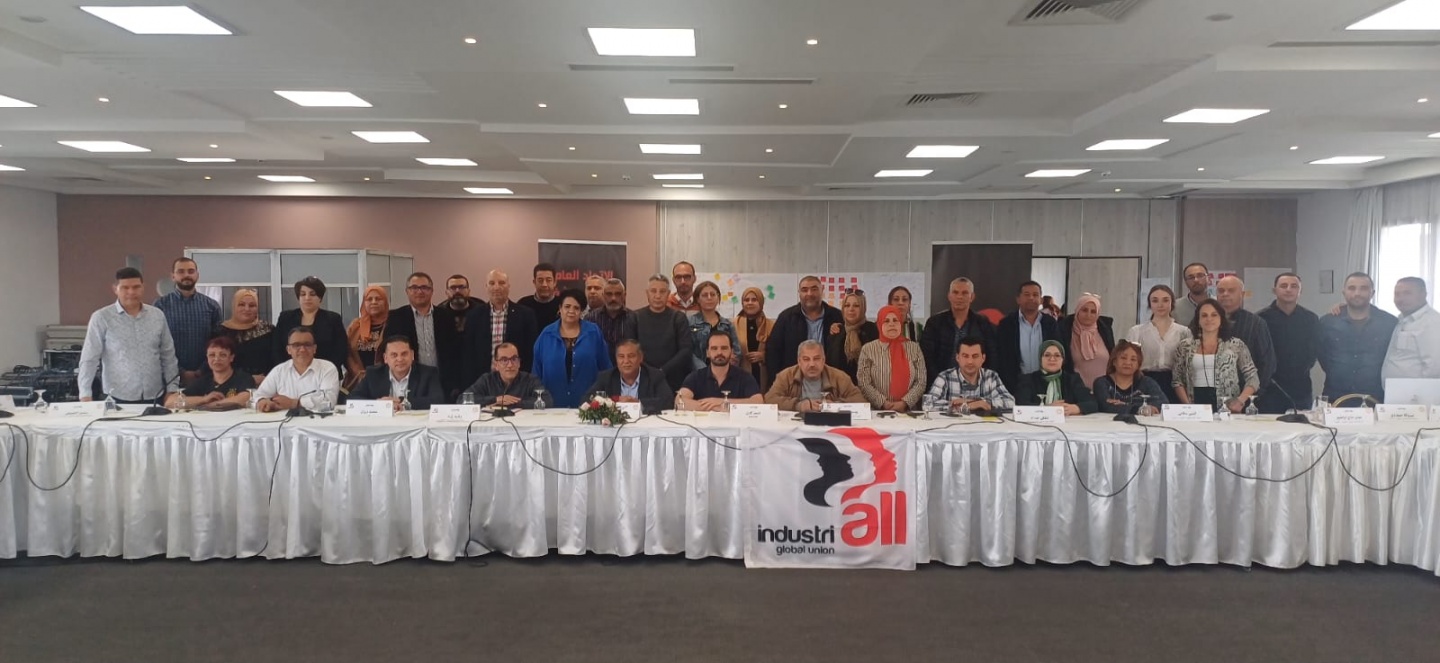Read this article in:
English
27 May, 2025Under the banner “Social dialogue: a cornerstone for promoting the textile, clothing and leather industry”, union and employer representatives in Tunisia’s garment sector came together to discuss joint solutions for the future of the industry.
The meeting brought together IndustriALL affiliates from the Fédération Générale du Textile, de l'Habillement, Chaussure et Cuir (FGTHCC-UGTT), affiliated to Tunisia’s national trade union centre UGTT and the Fédération Tunisienne du Textile et de l'Habillement (FTTH), representing employers in the sector. The session was also attended by Mondiaal FNV and the International Accord Foundation, who introduced global frameworks and initiatives that support decent work in global supply chains.
The meeting provided a space for open discussion on shared challenges facing the industry, including occupational health and safety, trade union rights, the need for living wages, outdated labour legislation and weak state support. With around 90 per cent of Tunisia’s garment factories operating under subcontracting arrangements for international brands, the sector is vulnerable to global market shocks.
“The textile sector is facing many difficulties due to its dependence on foreign markets, which makes it vulnerable to risks such as closures and mass layoffs,”
said Habib Hazemi, IndustriALL vice president and general secretary of FGTHCC-UGTT.
“That’s why social dialogue is essential, to find joint solutions that protect workers’ rights while ensuring the survival of the industry.”
Employers and unionists expressed particular concern about the invisibility of occupational diseases in the national health system. Workers in the sector face long-term health risks that are not formally recognized or compensated. Both sides called for training and awareness-raising campaigns to protect workers' health and well-being.
“We are ready to play our part in raising awareness among workers about the importance of complying with health and safety rules,” said a union representative. “But the state must also do more to recognize occupational diseases and ensure they are covered.”
Representing FTTH, Rachid Zrad underscored that dialogue should not be a one-off initiative.
“For us, social dialogue is a daily practice. Employers and workers share a common goal: maintaining decent work and ensuring the continuity of operations. But we cannot do it alone, the state must step up with a clear industrial strategy, reduce bureaucracy and support the sector’s development.”
Zrad welcomed the participation of global actors in the discussion, calling their presence “an added value” that can help identify practical solutions. He also recommended expanding the dialogue to include state representatives, to ensure all key stakeholders are involved in addressing systemic issues.
Ahmed Kamel, IndustriALL MENA regional secretary, highlighted that Tunisia’s textile sector has been a leader in advancing dialogue:
“This session confirms the commitment of Tunisia’s social partners to sustained engagement. The textile sector has often set the pace on wage negotiations and collective bargaining. Global tools such as the International Accord and ACT can support national partners to establish concrete guidelines for joint action and industry-wide improvement.”
Clara Kamphorst, stakeholder engagement manager at the International Accord Foundation, provided an overview of the Accord and its proven impact on workplace safety and industrial sustainability. Meanwhile, Quirine Lengkeek, policy advisor at Mondiaal FNV, introduced the Framework on Meaningful Stakeholder Engagement, stressing the importance of legitimacy, accessibility, safety, equitability and respect in all efforts to improve working conditions.
“Multinational companies must take responsibility for working conditions across their supply chains,” Lengkeek said. “Partnership and dialogue between trade unions, employers and civil society actors are key to reducing risks and protecting workers’ rights.”
The meeting agreed on a shared commitment to continue and deepen the dialogue. The parties agreed to hold regular meetings to develop joint initiatives aimed at sustaining the sector, improving working conditions and making the industry more attractive to a new generation of workers.
Both FGTHCC-UGTT and FTTH highlighted the need to rejuvenate the sector, which is suffering from a declining appeal among young people. Improving the image of the industry and ensuring better conditions will be essential for its renewal.
This meeting marked an important step towards collaborative solutions rooted in strong social dialogue, an approach that has the power to deliver decent work, sustainable industry and shared prosperity.
